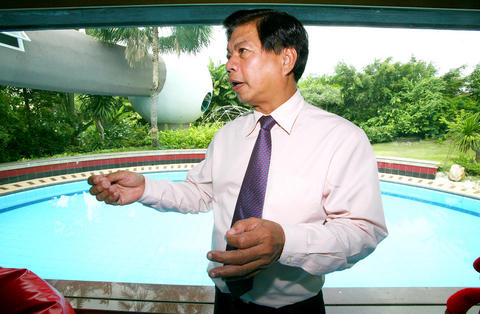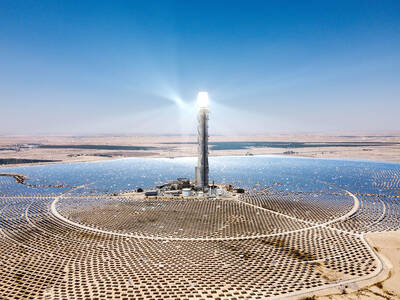Soontorn Boonyatikarn is a man of the times, throwing around terms like "eco-design" as he enthuses about the charcoal water recycling system at the Bangkok home he designed for his family two years ago.
His Bio-Solar House - designed not only to be energy efficient but to produce energy - was inspired by the humble mango tree, echoing the ideas of some of the brightest international names working in eco-architecture today.
"I threw the mango seed into the backyard. Three years later I picked up a mango," Soontorn said. "The mango tree does not need anything. The mango tree recycles everything, and it survives by the wind and the sun."

PHOTO: AFP
Unfortunately for this middle-aged professor of architecture, he is ahead of his time in Thailand, where despite abundant sunshine and a construction boom, talk of solar power and energy-efficient building design is largely rhetoric rather then reality.
But a few "green" projects are taking root.
When Soontorn built his first "eco-home" 15 years ago, everyone thought he was mad, he says. But in the past 10 years, he has designed about 200 homes, as well as a university and a handful of commercial properties.
"Now the impact is not strong, but it is getting there. With global warming, it is a sign that people have to think about the systems (they use)," he says.
Electricity for the Bio-Solar House is generated by 62.5m2 of solar paneling. They provide a surplus of energy, and every month Soontorn sells up to 1,000 baht (US$29) of electricity back to the national power grid.
All water is recycled, with the highly-insulated house also collecting dew, rain and condensation from the air conditioning.
Heat from the air conditioning warms the pool and the hot water, while the house is designed to make the most of natural light and air flow - simple measures that experts say would improve life for millions of people.
A recent report by the UN's Intergovernmental Panel on Climate Change said that eco-friendly buildings cut greenhouse gas emissions and reduce death and illness caused by poor air quality, especially in the developing world.
Some property developers are catching on to the fact that it is not just the environment that benefits but their bank balances too.
Bruno Pingel is president of Siam Best Enterprise, the firm behind Ocean 1 Tower, an eco-friendly apartment block the firms says will be the tallest building in Thailand.
He estimates that making Ocean 1 energy efficient costs just one percent of the total outlay, and says the money is quickly made back in energy savings.
The 91-floor luxury block, due to be completed by 2011 in the resort town of Pattaya, will use solar panels to power its shopping center, while the momentum of the lifts will also produce electricity.
Like Soontorn's house, the air conditioning will heat the water, and 80 percent of the water from the showers and taps will be cleaned and used to flush the toilets and fill the fountains and swimming pool.
"You have the hot water for free. You can charge the customers who live there and let them pay for the electricity they would have used for this amount of hot water, and you give them a 50 percent discount," Pingel says.
"So they are happy and you get your money back in about one or two years for the solar hot water system."
And as terms like "eco-chic" start appearing in the style sections of the world's newspapers, there is undoubtedly a certain cache in going green.
"For me, it's a selling aspect," says Pingel. "More and more people are into this issue (of global warming)."
But despite growing awareness and excited talk of an eco-building boom in Asia, Shailendra Yashwant, a climate campaigner with environmental group Greenpeace, says Thailand still has a long way to go.
"The policy makers will tell you that the potential is immense, but none of them are working on removal of barriers," he says.
"It is imperative that governments and financial institutions enforce legislation and mandatory requirements for all new buildings to incorporate and adopt 'green building' concepts," he adds.
Bangkok's Governor Apirak Kosayodhin in May announced an environmental plan for the capital, which included promoting energy-efficient buildings. But as yet, no incentives or laws for green buildings have been put forward.
Nikom Wairachpanit, director of the Bangkok Metropolitan Administration's environment department, says they will switch to energy-saving light bulbs and simply ask other government and commercial buildings to do the same.
"We don't plan for any measures to enforce them. If we do not receive any cooperation, we may consider later what should we do," he said.
"We are confident people are aware of global warming and ... will comply."
Yashwant predicts that brightly lit and inefficient buildings will dominate Bangkok's skyline for years to come, and it be some time before "eco-houses" start sprouting up like the mango trees they aim to copy.
"Soontorn's house is an experiment at best, that will be replicated by a few wealthy or alternative minded individuals," he says.

Google unveiled an artificial intelligence tool Wednesday that its scientists said would help unravel the mysteries of the human genome — and could one day lead to new treatments for diseases. The deep learning model AlphaGenome was hailed by outside researchers as a “breakthrough” that would let scientists study and even simulate the roots of difficult-to-treat genetic diseases. While the first complete map of the human genome in 2003 “gave us the book of life, reading it remained a challenge,” Pushmeet Kohli, vice president of research at Google DeepMind, told journalists. “We have the text,” he said, which is a sequence of

On a harsh winter afternoon last month, 2,000 protesters marched and chanted slogans such as “CCP out” and “Korea for Koreans” in Seoul’s popular Gangnam District. Participants — mostly students — wore caps printed with the Chinese characters for “exterminate communism” (滅共) and held banners reading “Heaven will destroy the Chinese Communist Party” (天滅中共). During the march, Park Jun-young, the leader of the protest organizer “Free University,” a conservative youth movement, who was on a hunger strike, collapsed after delivering a speech in sub-zero temperatures and was later hospitalized. Several protesters shaved their heads at the end of the demonstration. A

In August of 1949 American journalist Darrell Berrigan toured occupied Formosa and on Aug. 13 published “Should We Grab Formosa?” in the Saturday Evening Post. Berrigan, cataloguing the numerous horrors of corruption and looting the occupying Republic of China (ROC) was inflicting on the locals, advocated outright annexation of Taiwan by the US. He contended the islanders would welcome that. Berrigan also observed that the islanders were planning another revolt, and wrote of their “island nationalism.” The US position on Taiwan was well known there, and islanders, he said, had told him of US official statements that Taiwan had not

We have reached the point where, on any given day, it has become shocking if nothing shocking is happening in the news. This is especially true of Taiwan, which is in the crosshairs of the Chinese Communist Party (CCP), uniquely vulnerable to events happening in the US and Japan and where domestic politics has turned toxic and self-destructive. There are big forces at play far beyond our ability to control them. Feelings of helplessness are no joke and can lead to serious health issues. It should come as no surprise that a Strategic Market Research report is predicting a Compound